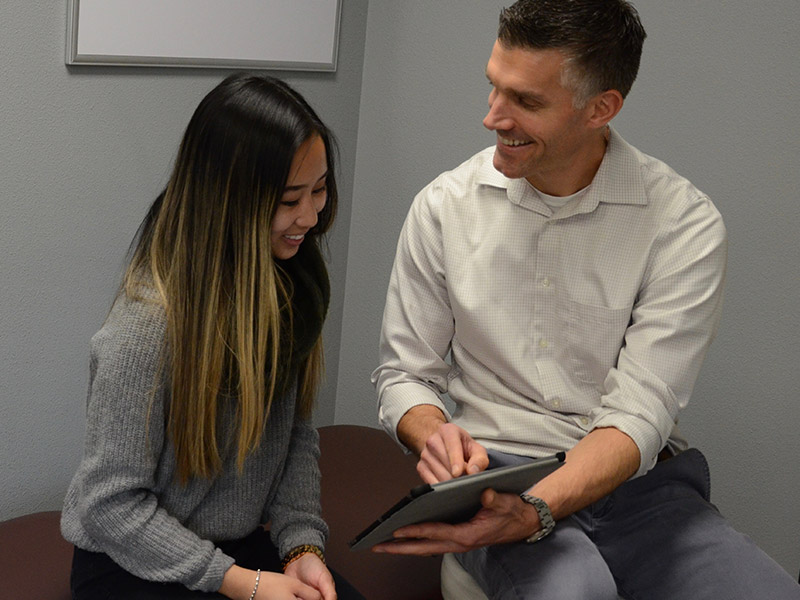It’s early, you’re driving to work, when BAM, a car runs a red light and side swipes your car. Your ears are ringing, your body is sore, and your heart is pumping. You feel okay but a bit weird. When the paramedics arrive, they ask if you hit your head, but you can’t remember, it happened so fast. They take you to the ER as a precaution. Imaging of your brain comes back clear, and you are diagnosed with whiplash and a “mild concussion” and sent home with instructions to simply rest until you feel better.
Now it is a few days after your car accident, and you still don’t feel like yourself. Your neck is sore, you have a tough time finding the correct words or names, you feel constantly fatigued, and you’re struggling to focus your attention. Wanting more answers, you decide to contact your physical therapist, the one who treated your knee pain a year or so ago.
During the evaluation, your PT tells you that they agree you have whiplash, however, they believe your concussion is actually what is causing many of your debilitating symptoms.
Common concussion signs and symptoms
- Dizziness
- Nausea/motion sickness/vomiting
- Difficulty concentrating or a feeling of being “one step behind”
- Off balanced/stumbling
- Headaches
- Blurry or double vision
- Hypervigilance/rumination
- Feeling overwhelmed/irritable
- Noise &/or light sensitivity
- Sleep difficulty &/or extreme fatigue
- Memory loss
- Increased feelings of anxiety/stress

Several of these symptoms stand out to you, and you and your physical therapist agree that conducting a comprehensive concussion evaluation is the best next step. Your PT, who has the education and expertise to evaluate and treat concussions, guides you through a series of balance tests, then observes how well you perform different head and eye movements and the effect these movements have on your symptoms. At the end of the exam, you are pretty wiped out, but your PT says they have a plan.
What a concussion diagnosis means
Now you’ve been diagnosed with a concussion and you’re wondering what this means. You’ve heard about it in football and other sports, and players seem to come back pretty quickly. However, your PT says your recovery can take some time and you’re wondering why.
A concussion is a traumatic injury to the brain that can be caused during a motor vehicle accident by a strike, blow, jolt or violent shaking to the head. You don’t have to physically hit your head to suffer a concussion. A concussion affects blood flow in your brain and makes it so your brain’s functions – thinking, reasoning, deciding – are all more difficult and can cause problems they didn’t before. A specially trained physical therapist can help guide you to retrain your brain to perform these tasks efficiently again.
Your PT explains that your brain is having trouble coordinating your eye and head movements. One of the fastest reflexes in your body, the Vestibulo-occular reflex (VOR), allows you to keep your eyes locked on a target while your head moves. Your eyes have to move in the exact opposite direction as your head at the exact same time (within 10 milliseconds) in order for the object you’re looking at to stay in focus. With a concussion, your VOR has been delayed, which explains why you’re having trouble focusing throughout the day. Your PT also explains that the temporary energy shortage in your brain explains your fatigue and difficulty with higher level cognitive tasks, such as word finding. You start feeling some relief now that you’re finally getting some answers, and your therapist continues with the best part — a plan to help you start feeling like your full self again.
The plan for concussion treatments
Physical therapy can be an effective treatment option for concussion. Because the severity of concussion can vary, however, physical therapists are trained to refer patients for further, advanced assessment when needed. Concussions can be complex and can often be best managed with a whole team approach. Therefore, your PT will work collaboratively with your doctor and an any other health care professional on your team.
After your physical therapy evaluation, and based on your individual situation, your PT will determine the best course of care for you to decrease your symptoms. Your plan will include customized exercises and recommendations for modifications to your daily activities. This may include:

- Performing “VOR” drills where your turn and nod your head (like saying “no” and “yes”) while fixing your gaze on a target taped to the wall
- Strengthening your neck
- Getting at least 15-20 minutes of exercise daily (at an intensity that doesn’t increase your symptoms)
- Electing for a gradual return to work or school and sports or activities
Concussion recovery
Several weeks go by and you are finally feeling back to normal. At the start you had to sit down and move slowly during the “VOR” drills, but now you can perform them while walking back and forth and keep up with a fast metronome beat. You have returned to your usual daily routine and activities, your focus is back, you feel energized, and you’re once again a master word finder. During your final visit, your PT takes you through the same tests they did during your first visit. They feel easy now, hardly requiring much effort at all.
You’re ready to put the car accident behind you.
We look forward to being a part of your healthcare team.
If you or someone you know has been in a motor vehicle accident and can’t seem to get back to feeling normal, concussion could be to blame. Symptoms of concussion can become immediately present or may arise weeks or months after the crash. Physical therapy can help.


